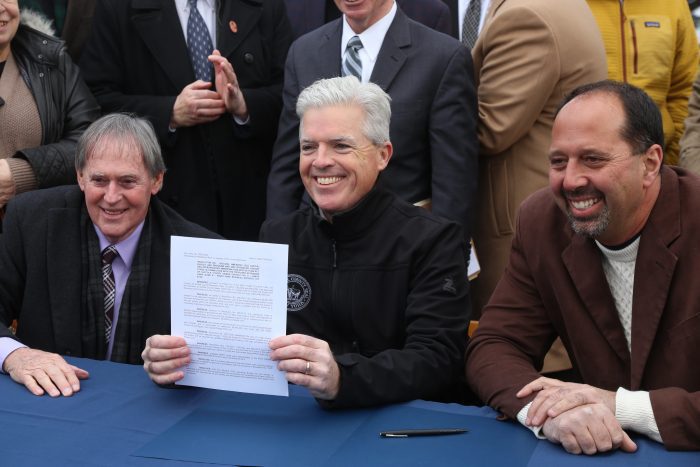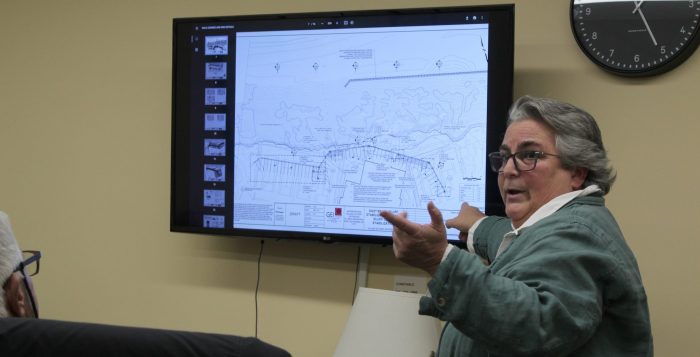Early voting is underway for the next Brookhaven town clerk, and the two major party candidates are making their pitch to the voters.
Former Town Clerk Donna Lent (I) retired in November, triggering a special election for her unexpired term ending in 2025. Town of Brookhaven Councilman Kevin LaValle (R-Selden) and community advocate Lisa Di Santo, the Democratic Party nominee, will square off at the polls Tuesday, Jan. 17.
During a joint meeting of the Selden and Centereach civic associations Thursday, Jan. 5, the two candidates were questioned on a range of topics related to the operations of the Town Clerk’s Office. Civic members generated some of the questions with others fielded from the audience.
Introductions
Di Santo is a former social studies teacher who taught students about participation in government. She also served as a trustee of the South Country school board in East Patchogue, where she lives.
“I have always participated in government, and I feel that I can be an independent voice of reason in the Town Clerk’s Office,” she said. “We have many of the same people filling many of the same positions over and over again. … That leads to a bit of stagnation, and I think it’s time for a fresh set of ideas, a fresh set of eyes, on what’s happening in the Town Clerk’s Office.”
Before entering government, LaValle owned a title agency. He then received a loan mortgage originator’s license and has worked in mortgage banking ever since. The councilman worked on the staff of former Suffolk County Legislators Dan Losquadro (R) and Tom Muratore (R). He was elected to serve Brookhaven’s 3rd Council District in 2013 in an area which includes Lake Grove, Centereach, Selden and parts of Lake Ronkonkoma, Farmingville, Port Jeff Station and a piece of Holbrook.
“I think I’ve accomplished a great deal as councilman, but I come before you now, again, to say that as town clerk, I am going to bring a new energy,” he said. “I am going to bring a new work ethic to the Town Clerk’s Office that has not been seen before.”
Duties of town clerk
Both candidates were asked about the function of the town clerk. For Di Santo, the clerk must ensure the accurate recording of Town Board meetings and the efficient filing of legal records, among other tasks. She emphasized the significance of the Freedom of Information Law request process.
“One of the most important things has to do with [being] the appeals officer for FOIL requests that come to the town,” she said. “People who live here and pay taxes should be able to access that information.”
The Democratic candidate also said the incoming clerk must assess and modernize the existing technology in the office. “I have spoken with some people who work in the Town Clerk’s Office and told me that their technology is at least 10 years out of date,” she said. “That is something that is certainly personally scary to me.”
LaValle viewed the clerk’s role as threefold, that is to “secure, maintain and distribute vital records of the residents of the Town of Brookhaven.” He referred to the office as a “vital hub,” servicing residents in the best and worst times.
“I believe the efficiency could be improved in the Town Clerk’s Office,” he said. “Cybersecurity, I think that’s something we can take to another level.”
He viewed the clerk as a service provider rather than a policymaker or revenue generator, noting that empowering and providing the staff with the necessary resources will be critical. “As the clerk, the focus will be about making sure the staff has the tools to be able to do their job,” he said.
Cybersecurity
Addressing the September ransomware attack against the Suffolk County government, LaValle assessed shortcomings within the county’s IT network. He described the need for coordination between departments, recommending the town continues its transition to cloud technologies to avert a similar scenario.
“The cloud is probably the best security that you can have, but we have to stay vigilant and make sure we’re looking at new technologies as we move along to make sure our information stays secure,” the councilman said.
Di Santo concurred that replacing outdated technology will be a priority. She stressed the need to properly oversee the transition to new platforms and work out any technical or logistic challenges that may arise.
“When you have new technology, one of the things that is crucial is to make certain that the staff is comfortable with that technology, that they’re fully trained so that they are able to use that to the best of their ability,” she said.
Staffing
After conversations with staff members, Di Santo painted a bleak picture of the current situation within the Town Clerk’s Office. “The office is actually understaffed,” she said. “Morale is really not very good in the office. You have a lot of turnover, so it’s very difficult to have the best customer service when you have staff changing and needing to be retrained.”
She reiterated that “a fresh set of eyes” from somebody outside government will help identify areas for improvement and generate potential solutions.
LaValle said he would prefer close collaboration with the Town Board, analyzing any barriers to efficient staff operations. He then stated a desire to fund personnel better.
“I want to be able to go in, take a real good look at what is going on in the office,” he said. “Do we need more employees? Should we pay our employees more?”
He also advanced the need to offer a vision the staff can get behind. “We have to work with the employees and build a team concept,” he said. “I want to make this the best clerk’s office in New York state. Without our employees buying into my leadership and what I want to do, that’s not going to happen.”
Resident access
Both candidates addressed the need to decentralize the office, to move services out of Town Hall and into the various hamlets and villages throughout the township. LaValle introduced a multipronged approach, including attending community meetings and building a more prominent multimedia presence.
“I want to be a town clerk going out to various functions,” he said. “A lot of people here see me in a lot of different events. That’s something I’m going to continue to do because I think the outreach of going out to the public and showing them what the clerk’s office does … is fundamentally important.”
He added, “I want to be able to go out and bring back some transparency — new social media platforms, doing videos on Channel 18 talking about what we can do to help residents.”
Di Santo said she has heard from multiple residents that resident access to public records can be slow. She again centered on requests for public information.
“The town clerk is the final appeals officer for the FOIL law,” she said. “In some cases, those requests get bounced from one department to another and the clock seems to run out.”
She added, “People who are residents, our taxpayers, are asking for information from their town, and in many cases it seems that it is being stonewalled. The town clerk has a responsibility to provide that information.”
Open government
Candidates were asked what the term “open government” means and how they would bring town government closer to the people.
“Open government means giving everyone the opportunity to participate at their fullest,” Di Santo said. “I would, as town clerk, try to appeal to the Town Board members to make many of the meetings much more accessible to the many people in the town who work.”
She also proposed bringing the operations of the Town Clerk’s Office to local libraries and other community forums. “The town clerk [could] go into each and every one of those council districts several times a year, appear at the senior centers and the local libraries to have discussions with people,” she said.
Like Di Santo, LaValle stressed he would maintain an active community presence if elected. “I want to go out, I want to be at senior centers, I want to be at civic meetings, I want to be in chambers of commerce, talking about what the clerk’s office does,” he said. “You have to get out there. You have to be a part of the community.”
Brookhaven residents will decide on these two candidates this Tuesday, Jan. 17. Polls open from 6 a.m. to 9 p.m., and residents can report to their regular polling place on Election Day.




















